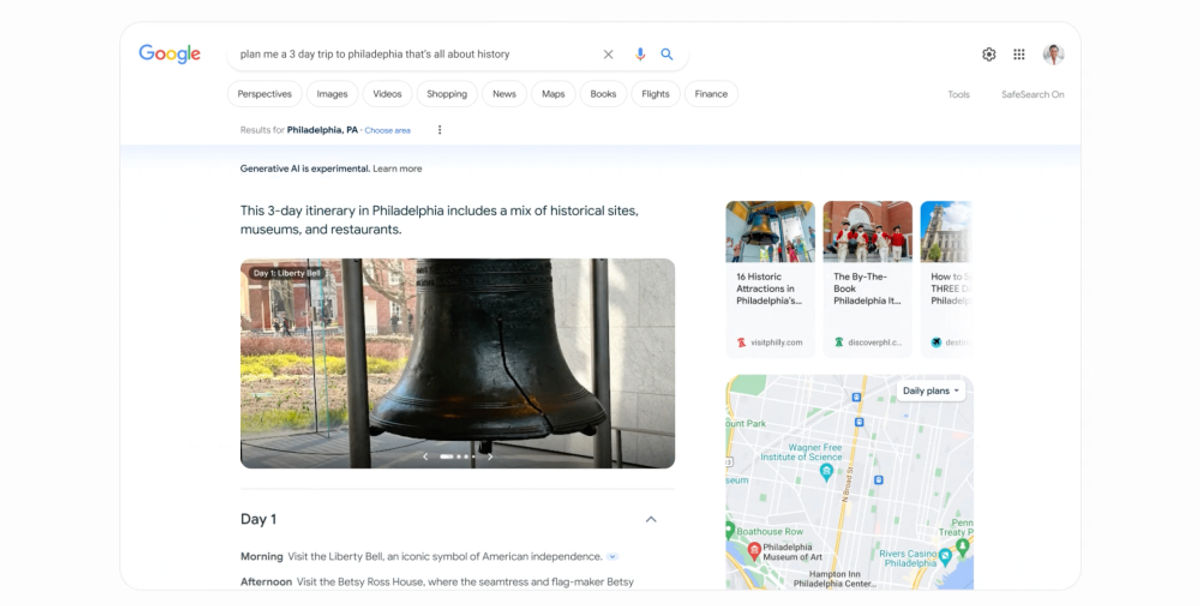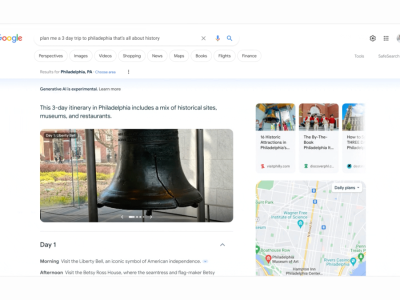Google is
enabling new generative artificial intelligence-powered tools in Search as part
of its continued testing of the technology to aid travelers as they plan a trip.
The new Search
experience can provide a suggested trip itinerary with an overview of hotel and
flight options as well as suggestions of attractions and dining – but, at least
for now, the results do not include ads.
According to a Google
spokesperson, the focus now is to experiment and refine the trip ideas
functionality, without ads, but in the future the search giant will test ads,
such as in dedicated slots in the results page and when the user asks follow-up
questions.
The new capabilities are available
for users in the United States, in English language only, that have enrolled in
Search Labs and enabled the Search Generative Experience (SGE).
Subscribe to our newsletter below
In a blog
post, Emmanuel Marot, director of product management for Search wrote that the suggested
itineraries will pull ideas from sites across the web and include things such
as reviews, photos and other Google Business profile details for more than 200
million places around the world.
According to
Google, the results will be surfaced similar to current Search functionality –
showing what Google determines are some of the most relevant options for the
flight, hotel or attractions query. And for flights and hotels, clicking those
results takes users into the Google Flights or hotel search page, with the
spokesperson adding that the company does not have plans to become a booking
site.
The generative
AI-created itineraries can be exported to Gmail, Docs or Maps.
Google
Maps updates
Google is
also updating functionality in Maps. Launching initially in the U.S. and Canada,
users that search for a city in Maps will now see lists of recommendations of
places to go from both publishers and other Maps users.
In a blog
post, Andrew Duch, Google’s director of product for Google Maps wrote, “Say
you’re planning a trip to New York or Los Angeles — just search for the city in
Maps and swipe up to see curated lists of recommendations from people who know
the city well. You’ll also see lists from sites you love, like The
Infatuation’s expert-curated restaurants, Lonely Planet’s guides to
iconic sites and hidden gems, The New York Times’ 36 Hours itineraries,
and OpenTable’s guides to the best new restaurants. If you find a list
you like, save it to your map or share it with friends.”
Google said
those four content partners are the only ones integrated at this time.
Beginning this week, Maps will
now also provide generate lists of restaurants, categorized as trending, top or
hidden gems, in more than 40 cities across the U.S. and Canada.
And later
this month, Maps will add two more updates. Maps users around the world will be
able to customize lists they create, for example by organizing locations chronologically
into an itinerary or to rank locations after visiting. And users will be able
to link content from their social channels – such as a restaurant review – to a
location saved in a list.
Google is
also updating its “Circle to Search” capability that has been available on
Android devices since January. The company said that “soon” users can use
Circle to Search to translate anything on their screen – for example a restaurant
menu – creating an instant translation without the need to open Google
Translate or another app.
Tripped up: Why trip planning startups stumble
Join this free webinar April 25 to hear from Mike Coletta, manager of research and innovation at Phocuswright and Gilad Berenstein, investor and former founder of Utrip, on their personal experiences with trip planning startups and what Phocuswright’s startup data tells us about success and failure.










